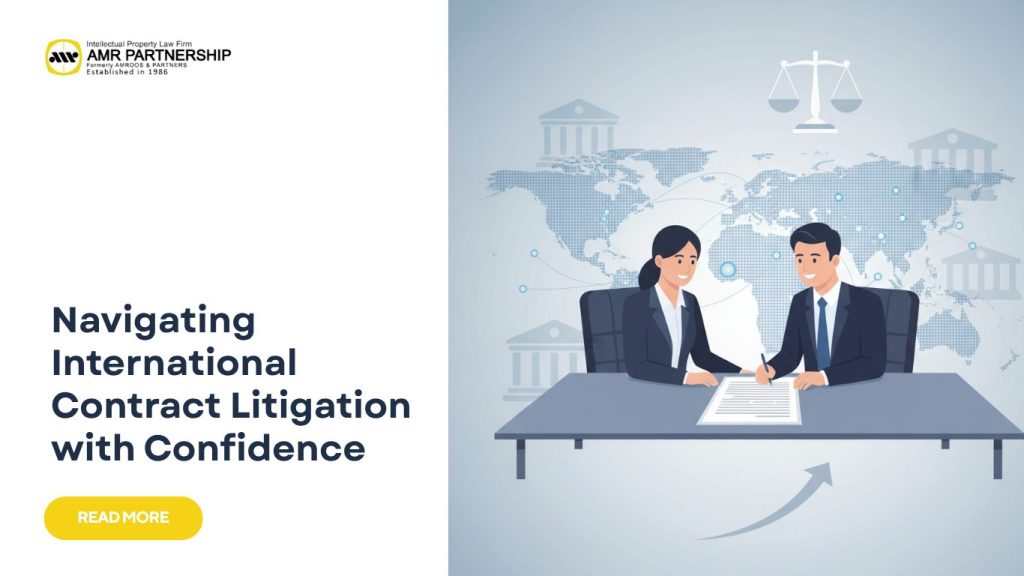
In today’s interconnected world, international contract litigation has become an essential topic for global businesses. Whether you’re a company expanding overseas or partnering with a foreign entity, the potential for disputes is real. Different legal systems, conflicting jurisdictions, and unfamiliar procedures can make cross-border litigation complex. That’s why understanding international contract litigation and having reliable legal guidance from amr.co.id can make a significant difference.
READ MORE: How Competition Litigation Shapes the Fight Against Predatory Pricing
When Business Goes Global, Disputes Can Too
Global commerce thrives on partnerships, joint ventures, and international contracts. However, with opportunity comes risk. Each country operates under its own legal framework, and even the most carefully drafted contracts can face unexpected challenges.
Imagine a scenario where a business in Singapore collaborates with a manufacturing partner in Germany. A disagreement arises over delivery timelines and quality standards. The question then becomes which country’s court has the authority to resolve the dispute? This is the essence of international contract litigation — managing legal conflicts across multiple jurisdictions.
According to the International Chamber of Commerce (iccwbo.org), over 30% of cross-border business disputes involve disagreements about which country’s court should handle the case. This highlights the importance of proactive legal planning to ensure contracts specify clear dispute-resolution mechanisms.
Understanding these mechanisms allows companies to focus on growth instead of costly legal uncertainty. That’s where international contract litigation strategy plays a crucial role.
READ MORE: The Role of a Patent Firm Indonesia in Handling Intellectual Property Disputes and Litigation
What International Contract Litigation Really Means
International contract litigation refers to the legal process of resolving disputes arising from contracts that involve parties from different countries. It can include issues such as breach of contract, enforcement of payment obligations, or violation of specific terms.
The complexity stems from the fact that each country has its own laws governing contracts, evidence, and enforcement. A dispute involving parties from Indonesia and the Netherlands, for instance, raises the critical question: which court has jurisdiction, and which law applies?
In such cases, businesses must consider:
- Jurisdiction, which court has the legal right to hear the case?
- Applicable law, which country’s laws govern the contract?
- Enforceability, will the court’s decision be recognized in the other party’s country?
Failure to clarify these issues beforehand can lead to prolonged disputes, unexpected expenses, and strained relationships between business partners. The litigation process can take years and involve extensive translation, travel, and coordination between legal systems.
That’s why legal foresight is invaluable. By consulting with experts in international contract litigation early on, businesses can prevent disputes from escalating or ensure they are resolved efficiently when they arise.
READ MORE: IP Law Firm Services in Jakarta: A Guide to Litigation and Dispute Resolution
The Power of Forum Selection Clauses
A vital tool in preventing cross-border legal confusion is the forum selection clause — a contractual provision that designates which court will handle any potential disputes. This clause is more than just a legal technicality; it’s a strategic safeguard.
For example, when drafting a contract between an Indonesian supplier and a U.S. distributor, both parties can agree that any dispute will be settled in Singapore. This decision ensures predictability, avoids jurisdictional uncertainty, and saves time and costs.
Benefits of a forum selection clause include:
- Predictability, parties know in advance where legal proceedings will take place.
- Efficiency, reduces time spent determining jurisdiction during disputes.
- Cost control, avoids unnecessary litigation in multiple countries.
- Prevention of forum shopping, stops one party from choosing a court perceived to be more favorable to them.
Without this clause, parties may find themselves in a legal tug-of-war across continents, adding stress and financial burden to an already difficult situation. Legal practitioners often view a well-drafted forum selection clause as one of the most effective tools for managing risk in global business transactions.
READ MORE: The Importance of Law Firms in Resolving Cases Through IP Litigation Law Firm
When Courts Step In – The Role of Judicial Discretion
Even with a clear forum selection clause, courts sometimes have the discretion to override it. This occurs when a court determines that the chosen forum would cause extreme inconvenience or injustice to one of the parties. This principle is particularly recognized in U.S. legal practice under the doctrine of forum non conveniens.
In contrast, European legal systems, especially under the Brussels Regulation, generally uphold the forum agreed upon in the contract, emphasizing respect for party autonomy. These differences demonstrate why understanding the nuances of international contract litigation is critical for multinational businesses.
For instance, if a dispute arises between a French company and a Canadian partner, and the contract states that litigation should occur in New York, a French court might still decline jurisdiction out of respect for the clause. However, a U.S. court could evaluate whether enforcing that clause would lead to an unfair trial for one party. Such judicial discretion adds complexity — and highlights why professional legal guidance is essential to navigating global disputes effectively.
READ MORE: How to Handle International Trademark Conflict Resolution Smartly?
Balancing Party Autonomy and Practical Fairness
At the heart of international contract litigation lies a delicate balance between party autonomy — the right of contracting parties to decide their terms — and judicial fairness. Courts must ensure that no party is unfairly disadvantaged, particularly when contracts involve unequal bargaining power.
For example, a small exporter may agree to a forum in a distant country simply because the larger corporation insisted. In such cases, courts may scrutinize whether enforcing the forum clause would deny one party fair access to justice.
Therefore, fairness plays a critical role in global contract enforcement. The best contracts strike a balance between predictability for both parties and flexibility to ensure equitable outcomes. Legal professionals specializing in international contract litigation can help achieve this equilibrium by identifying risks and recommending fair, enforceable clauses.
Legal consultation also helps businesses comply with international standards while protecting their commercial interests. Fairness, transparency, and compliance are not just ethical values — they’re strategic advantages that preserve reputation and trust across borders.
READ MORE: Brand Protection Services: Why Your Business Needs It Now
What Businesses Should Learn from This
Companies engaging in international trade should take away several key lessons:
- Include a forum selection clause in every cross-border agreement. This small addition can prevent years of legal uncertainty.
- Consult legal experts before signing. Understanding how different jurisdictions handle contracts can prevent conflicts later.
- Treat forum selection as a strategy, not a formality. It’s a decision that affects risk management, cost, and enforceability.
- Consider arbitration as an alternative to litigation. Arbitration clauses, recognized globally under the New York Convention, offer faster resolutions and confidentiality.
A proactive legal approach ensures your company operates with confidence and clarity, even in complex cross-border situations. Professional legal services specializing in international contract litigation can assess your existing agreements, identify potential risks, and develop solutions before disputes arise.
READ MORE: Design Patents in Fashion: How Style Meets Legal Protection
The Global Move Toward Predictability
As global commerce grows, international organizations are working to create more predictable dispute-resolution systems. One significant initiative is the Hague Convention on Choice of Court Agreements, which standardizes how courts across signatory countries recognize and enforce forum selection clauses.
This movement reflects the business world’s demand for consistency and trust. By harmonizing how courts handle contractual disputes, the Hague Convention reduces uncertainty and litigation costs for international companies. Businesses operating globally should be aware of whether their contracting partners’ countries are part of such agreements, as it directly impacts the enforceability of their contracts.
With experienced legal guidance, companies can leverage these international frameworks to enhance contractual certainty and avoid unnecessary litigation.
READ MORE: ? Z
How AMR Partnership Helps You Navigate Cross-Border Disputes
Managing cross-border disputes requires not just legal knowledge, but also strategic insight into multiple jurisdictions. A legal team experienced in international contract litigation can assist in:
- Drafting enforceable forum selection and arbitration clauses.
- Analyzing jurisdictional risks before agreements are signed.
- Representing clients in foreign or domestic courts.
- Negotiating settlements that align with international law.
Professional legal firms can also provide tailored pricing based on case complexity and jurisdiction. If you need more information on estimated costs or wish to discuss your contract dispute strategy, you can connect directly through WhatsApp or Instagram at amr.co.id.
READ MORE: Discover the Best Website Law Firm Indonesia for Your IP Needs
For a Confident Step Forward
In the landscape of global trade, clarity is power. Understanding international contract litigation ensures your business is equipped to handle disputes confidently and strategically. With the right legal partner, your contracts become not just agreements but protective shields against uncertainty. For consultation and pricing details, reach out via WhatsApp or Instagram through amr.co.id and take the first step toward protecting your international business interests.
- Phone (Hunting): +62-21-29036668
- Fax: +62-21-29036672 to 75
- WhatsApp Customer Service: Click here to chat
- Instagram: @amrpartnership
- TikTok: @amr.partnership
- Facebook: Law Firm AMR Partnership
- Official Website: www.amr.co.id






